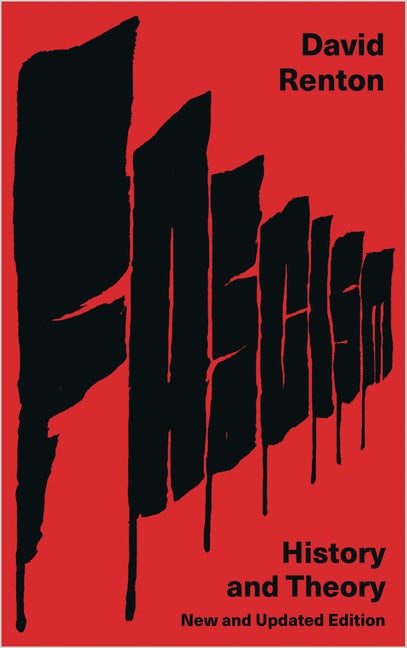Photo: Chris Nesseth / Shutterstock.com
Studying the history of fascism to cancel its future
- October 9, 2020
Fascism & Far Right
David Renton’s “Fascism: History and Theory” offers a thorough account of interwar Marxism’s understanding of fascism and lessons for how to resist it today.
- Author
It is said we live in a time of fascism. Donald Trump is a fascist, or Brexit is fascist. Conspiracy theorists say wearing masks is fascist whilst some worry — not unfoundedly — that the recent anti-lockdown rallies provide a hospitable environment for fascism. As the term becomes increasingly separated from the movements and parties that originally bore its name, is there any point, beyond historical interest, to think about the fascism associated with Mussolini and Hitler?
The answer, I would argue, is yes. Fascism represented the worst of the 20th century, and even a slight possibility of the return of fascism — or something like it — is enough for us to do everything we can to stop it. It is also true that fascism is not unique to one particular time period or one particular national context. There are still people who call themselves fascists and look to the legacy of fascism as inspiration for their own political activities. And it is not impossible for something like the conditions and circumstances that produced fascism to produce something like it again.

“Fascism: History and Theory” by David Renton is out now from Pluto Books
It is helpful then, even timely, that a revised edition of David Renton’s Fascism: History and Theory has been published. A revised edition is warranted, not least because Renton has written extensively on both fascism and anti-fascism in the twenty years since it was first published but also because we now live in radically different times. This is explored in further detail in Renton’s The New Authoritarians which is a useful companion to Fascism.
Fascism gives an account of the interwar fascism that grew and eventually took power in Italy and Germany through the lens of the socialists and communists who wrote and organized against it. The Marxists — including Leon Trotsky, Clara Zetkin, Antonio Gramsci, Walter Benjamin, among others — of whom Renton writes theorize a fascism that is, for them, a present and growing threat, both to themselves and to a wider revolutionary project. Some, like Trotsky and Benjamin, did not live to see fascism’s grim crescendo and some, like Gramsci, were victims of it. Consequently, the nature and urgency of their analysis changed as fascism did, they did not have the benefit of hindsight, nor of the extraordinary breadth of study that fascism has produced in subsequent decades.
We do have that benefit, and recognize the prescience of their analysis, particularly in what Renton terms “the anti-fascist wager” — the recognition that fascism is a uniquely destructive form of right-wing politics that has the capacity to grow rapidly and generalize existing suffering. We can, perhaps, take their insights — a refusal to take fascists at their word, the construction of fascism as an intersecting set of contradictions, an opposition organized as an united front — and apply them to our own organizing.
What should anti-fascists take from this book? A simple elucidation of positions within interwar Marxism is helpful in itself, specifically an exploration of what Renton terms the “dialectical” theory of fascism which is counterposed against a “left” theory of fascism — which argued that fascism was simply a tool of capitalist reaction — and a “right” theory — which painted fascism as a mass movement independent of the capitalist class. The dialectical theory rejects both of these contentions and instead explains fascism through its contradictions, primarily between the narrow interests of its leadership and the broader interests of its mass support. This contradiction gave fascism a capacity to radicalize even after it had gained power as the leadership could not satisfy the demands of its base through domestic policy and so turned to foreign conquest.
Anti-fascists today should look beyond this one application of contradictions. Any successful anti-fascist project, be it a campaign, group or front, should seek out antagonisms within the movements they oppose and work to apply pressure on them. These could be antagonisms between the leadership and their supporters, between competing interests in uneasy coalitions or between far-right ideologies.
It is also not necessary to be on board with the Trotskyist conception of a united front to recognize, rightly, that a far-right movement that seeks to build mass support is best opposed with a movement that organizes mass opposition, one that seeks to accommodate difference within itself. There should be room within anti-fascist movements for a diversity of tendencies and a range of tactics. Ideally there should be coordination between these tendencies so that each is complemented by the other. We should also look to movements in recent years, like the annual Women’s Strike mobilizations, that emphasize aspects of social reproduction and care which have often been made invisible within anti-fascism and work to make sure that anyone, regardless of capacity, is able to contribute.
We live in an increasingly precarious time, one defined by the slow catastrophe of the climate crisis and the attendant shocks of ecological collapse, natural disasters and societal degradation. The Global South will be the first to feel the effects, but the West is not immune.
In the face of these conditions, a kind of fascism may find fertile ground. Even more likely is the expansion and intensification of existing state regimes of borders, prisons and control so as to better manage our bleak future. Twenty years on, Fascism: History and Theory not only remains a thorough account of interwar Marxism’s understanding of fascism, but also provides a strong argument for a vital understanding of fascism, both in analysis and as practice.
Source URL — https://roarmag.org/essays/studying-the-history-of-fascism-to-cancel-its-future/

